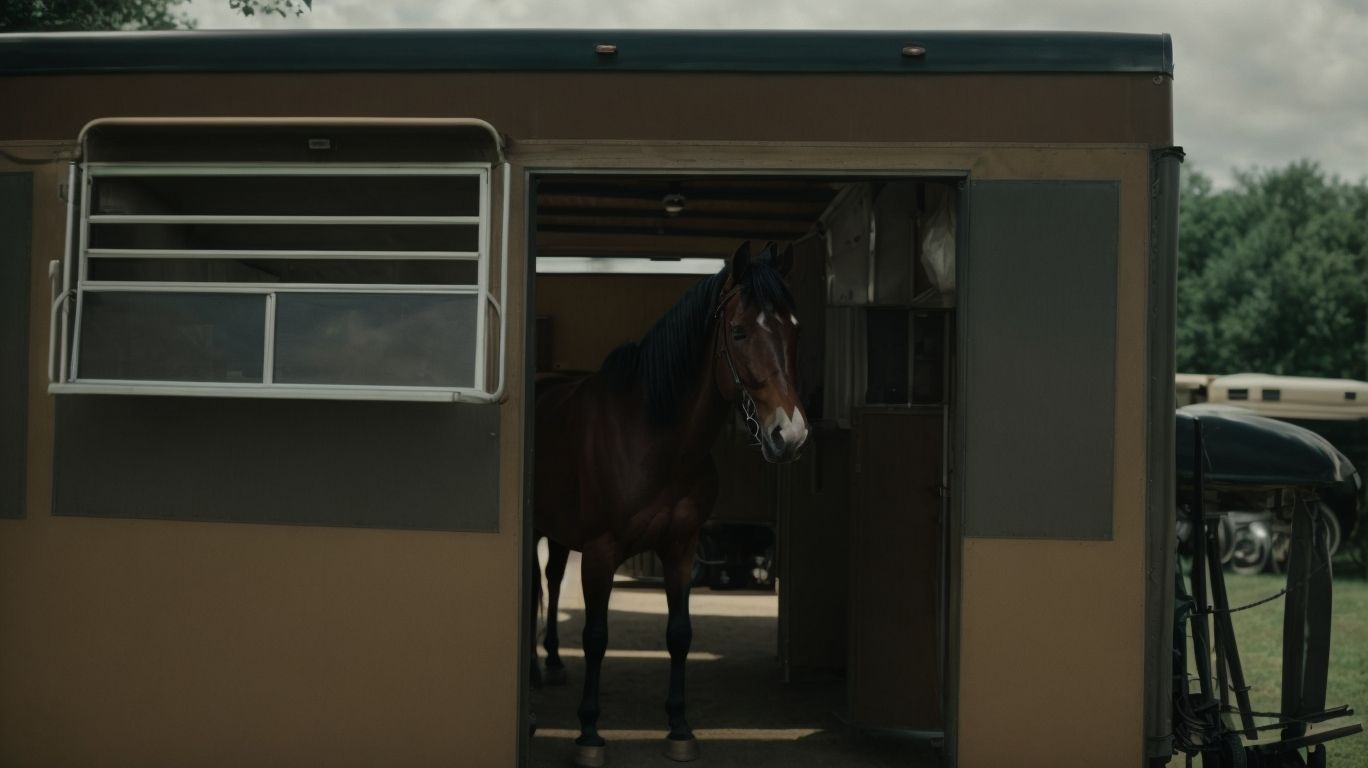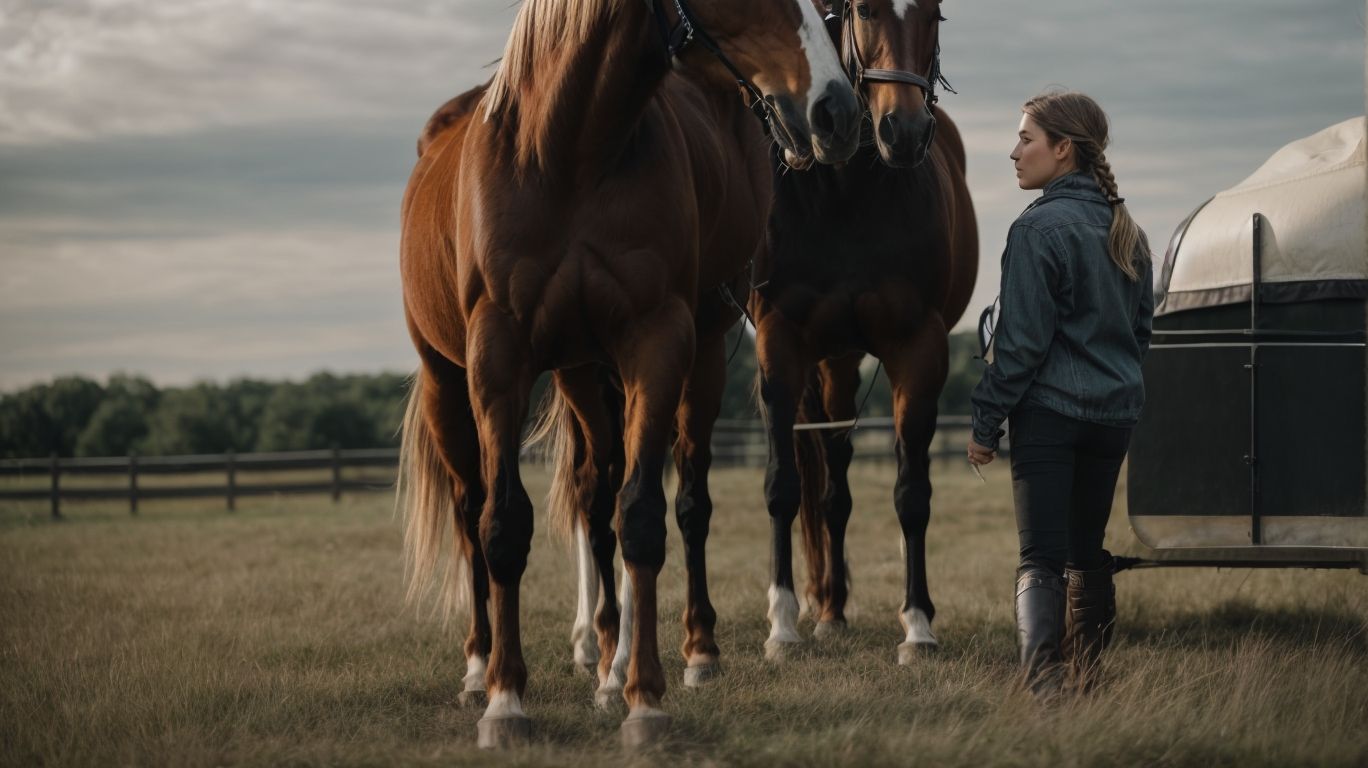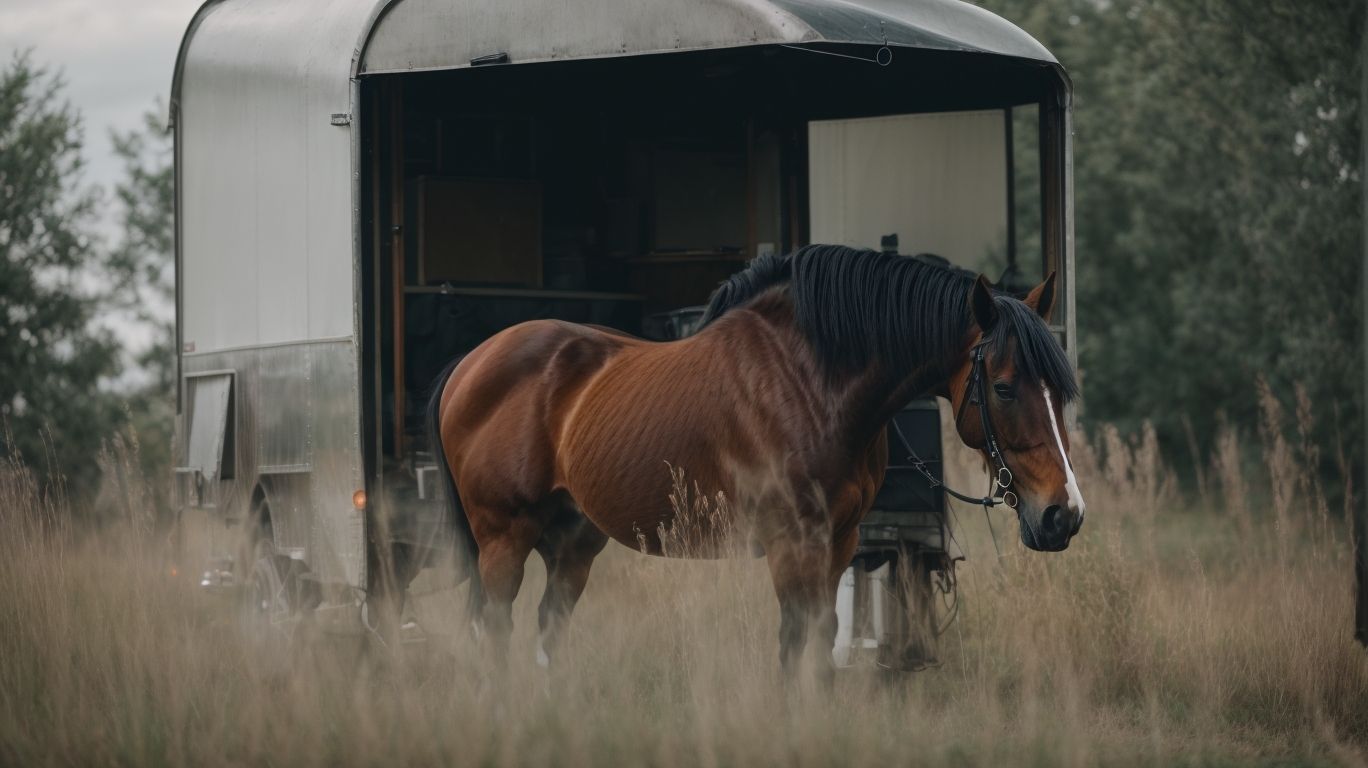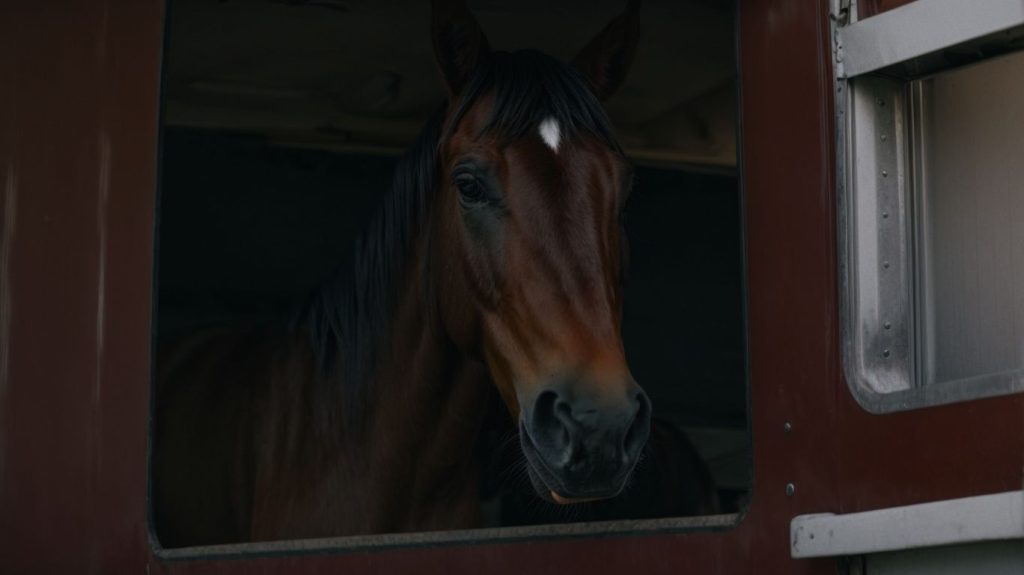Is your horse feeling anxious and nervous when it comes to trailer travel? The experience can be stressful for both you and your equine companion, but understanding the reasons behind this nervousness and learning how to prepare and calm your horse can make a significant difference.
In this comprehensive guide, we will explore the potential causes of your horse’s nervousness in the trailer, along with practical tips and techniques to help your horse feel more at ease when traveling. We will also discuss the risks associated with a nervous horse in the trailer and provide valuable insights on how to keep your horse calm and safe during trailer travel.
Whether it’s fear of enclosed spaces, negative past experiences, or motion sickness, we’ve got you covered with expert advice to ensure a comfortable and stress-free experience for both you and your horse. So, let’s dive into understanding and addressing your horse’s trailer travel anxieties.
Key Takeaways:
- Introduce your horse to the trailer before traveling to help them feel more comfortable in the space.
- Practice loading and unloading your horse from the trailer to build their confidence and trust in the process.
- Consider natural calming methods, using a trailer tie, or sedation if your horse is still nervous during trailer travel.
Why Is Your Horse Nervous In The Trailer?

Credits: Horselife.Org – Terry Johnson
Transporting a horse in a trailer can be a stressful experience for the animal, often leading to nervous behavior and anxiety.
One of the primary reasons for a horse’s nervousness during trailer transportation is the enclosed space. Horses are naturally wide-ranging animals, and confinement in a small space can trigger feelings of unease and discomfort. Negative past experiences, such as a traumatic incident during a previous trailer ride, can also contribute to heightened anxiety. The motion of the trailer can further exacerbate this uneasiness, potentially leading to symptoms of motion sickness that can distress the animal.
Fear of Enclosed Spaces
Many horses exhibit fear and anxiety when confined in enclosed spaces such as trailers, which can be attributed to their natural instinct for open spaces and freedom.
This fear often stems from their evolutionary instincts as prey animals to seek safety in open areas where they can detect and evade potential threats.
Horses are inherently wired to be hyper-aware of their surroundings to ensure their survival, and being confined triggers their flight response, leading to stress and unease.
To address this fear, gentle desensitization and positive reinforcement techniques can be employed to gradually acclimate horses to enclosed spaces.
Training exercises involving gradual exposure to trailers and rewarding calm behavior can help horses overcome their fear and build confidence in such environments.
Negative Past Experiences
Horses may develop nervousness in trailers due to negative past experiences, such as instances of rough handling, accidents, or discomfort during transportation.
This can lead to a heightened level of anxiety and fear when approaching trailers or during transportation. The anxiety resulting from these negative experiences can manifest in a variety of ways, including refusal to load, excessive sweating, trembling, or restlessness. It’s essential for owners and handlers to recognize and address these signs of distress, as prolonged stress can have detrimental effects on the horse’s mental and physical well-being.
Implementing desensitization training, introducing positive reinforcements, and creating a calm and familiar environment inside the trailer are effective strategies to alleviate the anxieties stemming from past negative experiences.
Motion Sickness
Some horses may experience motion sickness during trailer travel, leading to discomfort, unease, and nervous behavior as a response to the unfamiliar and unsettling sensation of movement.
This phenomenon occurs due to the complex nature of equine physiology and their sensitive balance system. The unfamiliar swaying and irregular movements during transportation can disrupt their inner ear equilibrium, causing nausea and nervousness. Symptoms of motion sickness in horses may include excessive sweating, restlessness, frequent shifting of weight, and even vomiting. It’s crucial for horse owners and handlers to recognize these signs and address them appropriately.
One way to manage motion sickness in horses during trailer travel is to ensure proper ventilation and a comfortable, stable trailer environment. Avoiding sudden accelerations, sharp turns, and abrupt stops can also help minimize the impact of motion sickness. Providing familiar bedding, hay, and water can offer a sense of comfort and stability to the horse, reducing the likelihood of sickness.
How To Prepare Your Horse For Trailer Travel?
Preparing your horse for trailer travel involves gradual introduction, positive reinforcement, and creating a comfortable environment within the trailer.
When introducing your horse to the trailer, it’s essential to start slowly. Begin by allowing your horse to explore the trailer without any pressure. This will help them become accustomed to the surroundings and reduce their anxiety. Positive reinforcement plays a crucial role in this process. Use treats, praise, and patience to encourage your horse to enter the trailer willingly.
Creating a comfortable environment within the trailer is paramount. Ensure the trailer is clean, well-ventilated, and adequately padded. Providing familiar bedding and bringing along their favorite hay can help alleviate stress. Consider the temperature inside the trailer; horses are sensitive to heat, so adequate ventilation and temperature regulation are essential.
Introduce Your Horse To The Trailer
Properly introducing your horse to the trailer is crucial for acclimating the animal to the environment and minimizing anxiety associated with the transportation experience.
One effective technique for familiarizing your horse with the trailer is to gradually introduce it to the sight, sounds, and smells of the trailer. This can be done by allowing the horse to explore the trailer without any pressure, providing positive reinforcement when the horse shows curiosity or comfort around the trailer. It’s important to incorporate positive associations with the trailer, such as feeding the horse near the trailer, spending time near it, and gradually leading the horse inside using treats or a target stick.
Practice Loading And Unloading
Regular practice sessions for loading and unloading the horse from the trailer not only build familiarity but also reduce stress and anxiety associated with the transportation process.
Training methods such as positive reinforcement, desensitization, and gradual exposure to the trailer can significantly contribute to the horse’s comfort during loading and unloading. By familiarizing the horse with these routines, the anxiety levels are minimized, leading to a safer and more relaxed transportation experience. Consistent practice also helps in preventing potential reluctance or fear-based reactions from the horse, making the process smoother and stress-free for both the animal and the handler.
Make The Trailer A Comfortable Space
Transforming the trailer into a comfortable and inviting space for the horse involves proper padding, ventilation, and ensuring the animal feels secure and at ease within the confined environment.
Regarding padding, the flooring and walls should be covered with thick, non-slip rubber mats, providing cushioning and stability during travel. Proper ventilation is vital to prevent overheating, with windows or vents that can be adjusted to allow fresh air circulation. Safety is paramount; all latches, hinges, and dividers should be secure, and the interior should be free from sharp edges or protrusions. Psychological comfort can be achieved with familiar bedding, incorporating the horse’s favorite and familiar scents to provide a sense of familiarity and ease.
What To Do If Your Horse Is Still Nervous In The Trailer?

Credits: Horselife.Org – Dylan Hall
If your horse continues to exhibit nervousness in the trailer, exploring natural calming methods, trailer ties, and sedation can be viable options to manage the animal’s behavior and anxiety during transportation.
One natural calming method worth considering is utilizing calming supplements or herbs, such as chamomile or valerian root, which can help relax the horse without the need for sedation. Providing the horse with a familiar, comfortable environment within the trailer can also ease its anxiety. Investing in a well-fitted, quality trailer tie can offer a sense of security to the horse during travel, preventing excessive movement and potential injury. While natural methods are preferred, it’s essential to consult with a veterinarian to discuss the appropriate use of sedation, should it be necessary for extremely nervous horses.
Try Natural Calming Methods
Implementing natural calming methods such as soothing music, pheromone-based products, or herbal supplements can help alleviate a horse’s anxiety and nervous behavior during trailer transportation.
For example, playing classical music or nature sounds can have a remarkably soothing effect on horses, minimizing their stress levels and promoting relaxation.
Additionally, pheromone-based products like calming diffusers or sprays can provide a sense of security and reduce the horse’s anxiety by mimicking natural equine pheromones.
Introducing herbal supplements can also contribute to easing a horse’s tension. Natural ingredients such as chamomile and valerian root are known for their calming properties and can be beneficial in promoting a sense of tranquility during trailer travel.
Use A Trailer Tie
Employing a trailer tie or restraint system can provide a sense of security and stability for the horse, reducing anxiety and minimizing the risk of panicked behavior during transportation.
There are various types of trailer ties and restraint systems available, including adjustable quick-release ties, cross-ties, and bungee ties. Each type caters to different levels of security and freedom for the horse during transportation. Safety considerations, such as breakaway features and proper installation, are crucial to ensure that the system effectively safeguards the horse without posing any risks.
Implementing a trailer tie or restraint system not only promotes physical safety but also contributes to the horse’s mental well-being. By minimizing excessive movement and potential injury, these systems help the horse feel more at ease and secure, positively impacting their behavior and attitude towards transport experiences.
Consider Sedation
In cases of extreme anxiety or nervous behavior, consulting a veterinarian to consider sedation for the horse during trailer travel may be a viable option to ensure the safety and well-being of the animal.
When a horse exhibits severe anxiety or nervousness during trailer transportation, it can not only be distressing for the animal but also pose significant risks to both the horse and the individuals involved in the transportation process. Therefore, involving a veterinarian in the decision-making process becomes crucial. The veterinarian will evaluate the horse’s condition and recommend the appropriate sedation protocol based on the specific needs of the horse.
It’s essential to prioritize safety protocols when administering sedatives to horses for trailer travel. Working closely with the veterinarian, it’s crucial to follow the dosage recommendations, timing of administration, and monitoring requirements to ensure the sedation is administered effectively and safely. Ensuring that the horse is comfortably accommodated in the trailer with proper ventilation and space is vital to mitigate any potential risks associated with sedation.
The use of sedatives can have a significant impact on the horse’s experience during trailer transportation. When administered appropriately, sedation can help alleviate the horse’s anxiety, promoting a calmer and less stressful travel experience. This not only benefits the horse’s well-being but also contributes to a smoother and safer transportation process, reducing the likelihood of accidents or injuries.
What Are The Risks Of A Nervous Horse In The Trailer?

Credits: Horselife.Org – Elijah Lopez
A nervous horse in the trailer poses risks such as self-inflicted injuries, trailer damage, and potential harm to other animals within the confined space, necessitating proactive measures to address and mitigate such dangers.
Self-inflicted injuries can occur from a horse’s excessive kicking, pawing, or rearing in response to nervousness. These actions may result in cuts, bruises, or even broken limbs, leading to considerable pain for the horse and potential financial strain for the owner.
A nervous horse can cause damage to the trailer itself, such as denting or breaking the interior walls, floor, or partitions. This not only compromises the security of the horse during transport but also creates costly repairs for the owner.
In addition, the potential harm to other animals in the confined space is a significant concern. A nervous horse may kick or push against other animals, leading to injuries, increased stress, and behavior issues among the animals involved.
Proactive measures such as proper training, gradual desensitization, and the use of calming aids can help reduce these risks and ensure a safer travel experience for all involved.
Injury To The Horse
The heightened anxiety and nervous behavior of a horse in the trailer can increase the risk of self-inflicted injuries, such as kicks, pawing, or sweating, due to the animal’s heightened stress and discomfort.
When horses are confined to a trailer, their normal instincts may lead them to react in ways that can harm themselves. Stress and discomfort can cause them to kick the trailer walls or paw the floor, potentially leading to injuries. Excessive sweating and increased heart rate are also common signs of their distress, further indicating the potential for harm.
It’s essential to recognize that a nervous horse not only poses risks to itself but also to anyone handling or traveling with the animal. Fortunately, transporting horses safely relies on understanding these risks and implementing practical measures to mitigate them.
Damage To The Trailer
A nervous horse in the trailer may exhibit behaviors that can lead to trailer damage, such as kicking, excessive pawing, or exerting excessive force, potentially compromising the structural integrity and safety of the transportation equipment.
These behaviors can cause dents, scratches, and even structural weakening of the trailer, posing risks to the safety of both the horse and the handlers. It’s important to recognize the signs of nervousness in a horse and take measures to address and mitigate them before the transportation begins.
Common preventative measures include:
- Ensuring a comfortable environment for the horse.
- Providing adequate padding and support.
- Introducing gradual acclimatization to the trailer.
Proper trailer maintenance, such as regular inspection of flooring, partitions, and reinforcement, can help mitigate the risks of damage caused by nervous horse behavior during transportation.
Risk To Other Animals In The Trailer
A nervous horse in the trailer can pose a risk to other animals within the confined space, potentially leading to conflicts, injuries, or heightened stress levels among the occupants, necessitating measures to ensure the safety and well-being of all animals during transportation.
When a horse becomes agitated during transportation, it can become a source of significant trouble for other animals sharing the trailer. The nervous behavior of a horse can agitate other animals, triggering a chain reaction of stress and anxiety amongst everyone inside. This not only endangers the physical well-being of the animals but can also lead to a decrease in their overall transportation safety.
Safeguarding the animals in transit requires implementing well-thought-out handling techniques and environmental management strategies. By utilizing techniques such as partitioning the trailer space or utilizing calming aids, the risk of conflicts and injuries among the transported animals can be reduced.
How To Keep Your Horse Calm During Trailer Travel?
Maintaining a calm and comfortable environment during trailer travel involves strategies such as adequate ventilation, frequent stops, and soothing stimuli to reduce stress and promote the horse’s well-being.
Proper ventilation is crucial for maintaining a comfortable atmosphere inside the trailer. It’s essential to ensure that fresh air can adequately circulate, especially during warmer weather or when traveling long distances. This can be achieved by using windows, roof vents, or other ventilation systems to keep the air inside the trailer fresh and non-stagnant.
Incorporating rest stops into the travel plan can significantly benefit the horse. Making regular stops allows the horse to stretch its legs, rehydrate, and take a break from the confinement of the trailer. These breaks can also help reduce anxiety and prevent exhaustion during extended journeys.
Introducing soothing stimuli, such as playing calming music or using calming pheromone products, can further aid in creating a tranquil environment for the horse. These strategies can help alleviate stress and induce a sense of calmness, contributing to a smoother and more peaceful trailer travel experience for the horse.
Provide Adequate Ventilation
Ensuring proper ventilation within the trailer is essential to maintain air quality, regulate temperature, and create a comfortable atmosphere that promotes relaxation and reduces anxiety for the horse during transportation.
When a trailer lacks proper ventilation, it can lead to poor air circulation, increasing the concentration of dust, ammonia, and other harmful particles. This can not only irritate the horse’s respiratory system but also cause stress and discomfort. Inadequate ventilation can result in high temperatures inside the trailer, posing the risk of heat stress and dehydration for the horse. By ensuring adequate ventilation, owners can provide a calming environment for their horses and contribute to their overall well-being.
Make Frequent Stops
Incorporating frequent stops during trailer travel allows the horse to rest, stretch, and alleviate the physical and psychological stresses associated with prolonged confinement, contributing to a calmer and more comfortable experience.
Regular rest stops are crucial for managing the physical and emotional well-being of horses during long distance travel. The breaks provide an opportunity for the horse to loosen its muscles and avoid stiffness, reducing the risk of injury. These stops allow for better air circulation, helping to minimize respiratory issues that can arise from extended periods of confinement. Rest stops enable the horse to lower its stress levels and regain a sense of security, crucial for maintaining its overall health.
Play Soothing Music
The use of soothing music within the trailer can have a calming effect on horses, helping reduce stress, anxiety, and promoting a more relaxed and comfortable state during transportation.
Research suggests that music can influence animals’ behavior, and horses are no exception. When selecting music for horses during trailer travel, it’s essential to consider their sensitive hearing and natural inclinations.
- Classical music, such as compositions by Mozart or Tchaikovsky, is often favored for its soothing and harmonious qualities.
- Nature sounds or instrumental music with a slow tempo can mimic the calming rhythms of the natural environment, helping horses to stay serene.
Creating a tranquil atmosphere within the trailer also involves minimizing sudden movements and providing sufficient ventilation. Since familiar tunes can contribute to a sense of security, playing consistent music may further alleviate the potential stress of transportation.
Frequently Asked Questions
What should I do when my horse is nervous in the trailer?
The first step is to remain calm and try to figure out the cause of your horse’s nervousness. It could be due to previous negative experiences, discomfort, or fear of confined spaces. Once you have identified the reason, you can take appropriate steps to help your horse feel more comfortable.
How can I prevent my horse from getting nervous in the trailer?
One of the best ways to prevent trailer anxiety in horses is through proper training and desensitization. Introduce your horse to the trailer gradually and make it a positive experience by offering treats and praise. Also, ensure that the trailer is well-ventilated and has enough space for your horse to move comfortably.
What if my horse has had a negative experience in the trailer before?
If your horse has had a previous negative experience in the trailer, it may take some time and patience to help them overcome their fear. Start by working on building trust with your horse and gradually reintroduce them to the trailer using positive reinforcement techniques.
Is it safe to sedate my horse when they are nervous in the trailer?
It is not recommended to sedate your horse when they are nervous in the trailer. Sedation can mask your horse’s fear and may lead to further anxiety in the future. It is best to address the root cause of their nervousness and work on desensitization techniques instead.
What can I do to make the trailer more comfortable for my horse?
There are a few things you can do to make the trailer more comfortable for your horse. Ensure that the trailer is clean, well-ventilated, and has enough space for your horse to move around. You can also use hay or treats to keep your horse occupied during the journey.
Should I consult a professional if my horse is consistently nervous in the trailer?
If your horse continues to display extreme anxiety or fear in the trailer, it may be beneficial to consult a professional trainer or veterinarian. They can assess the situation and provide expert guidance on how to help your horse overcome their trailer nerves.



